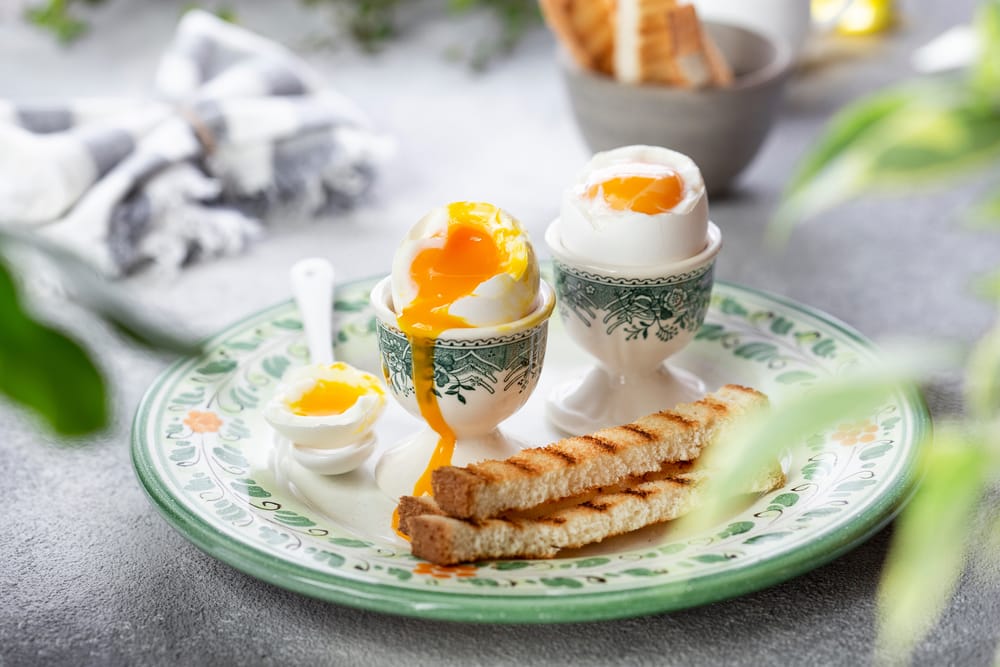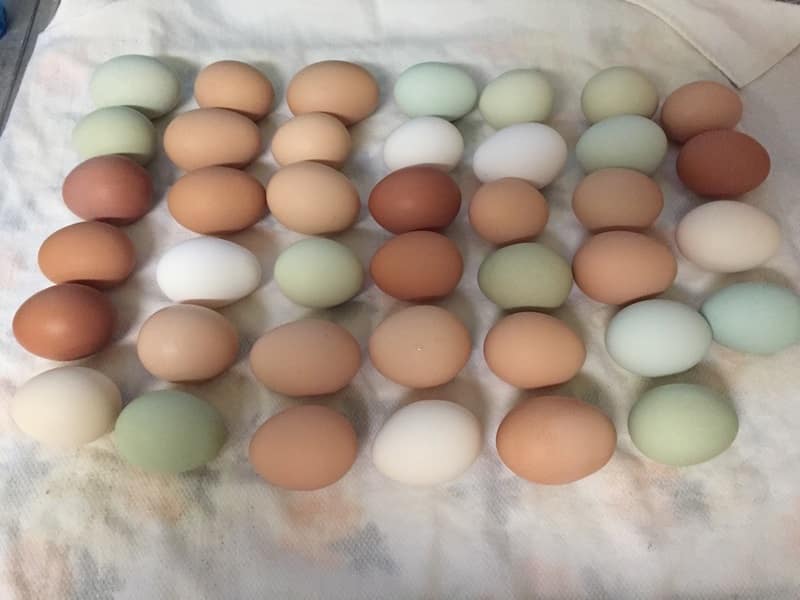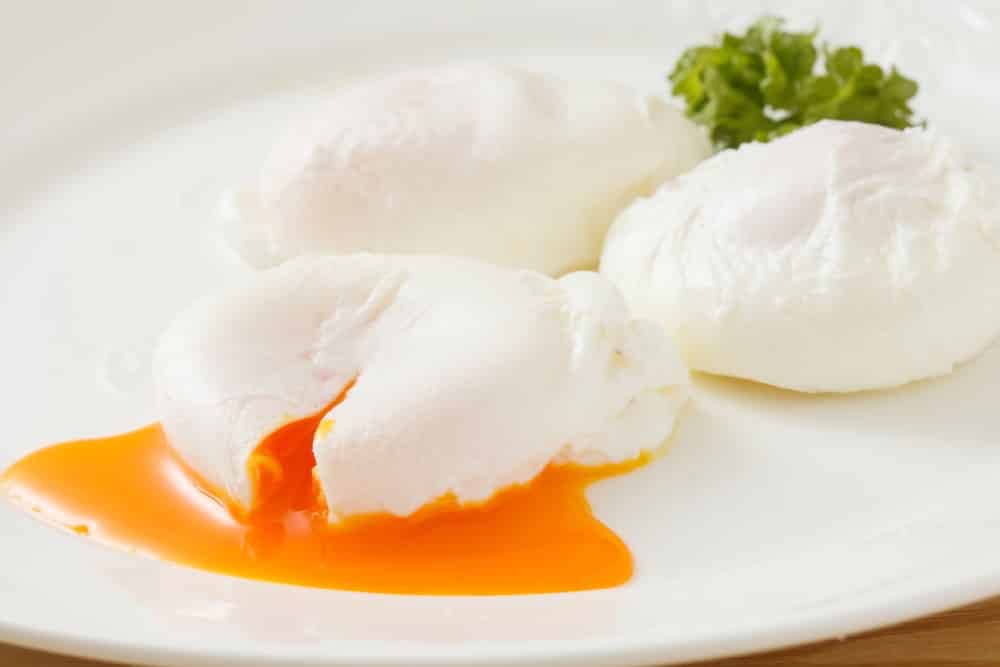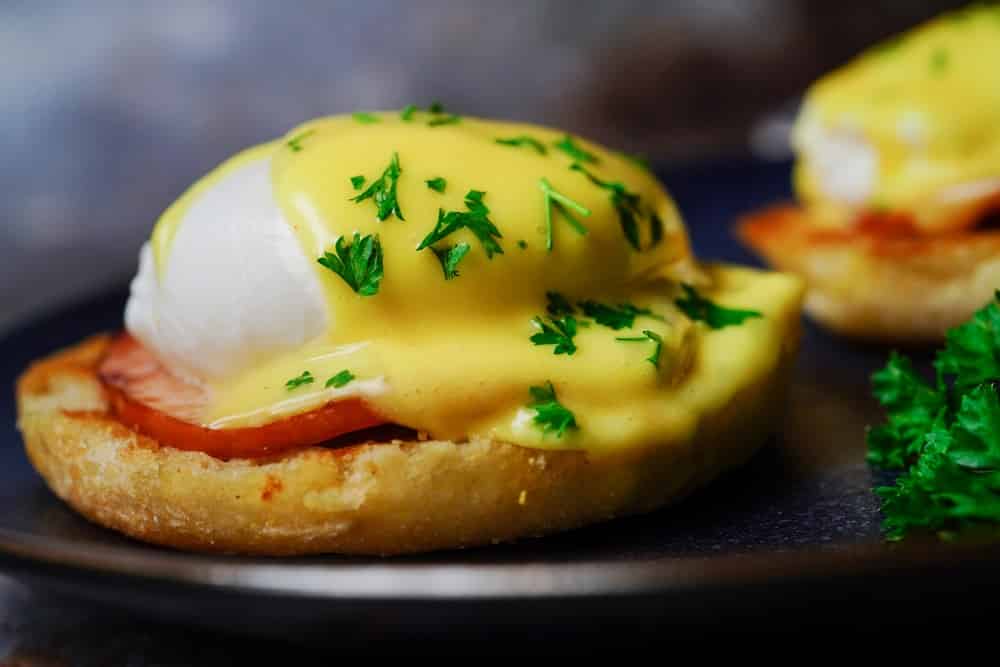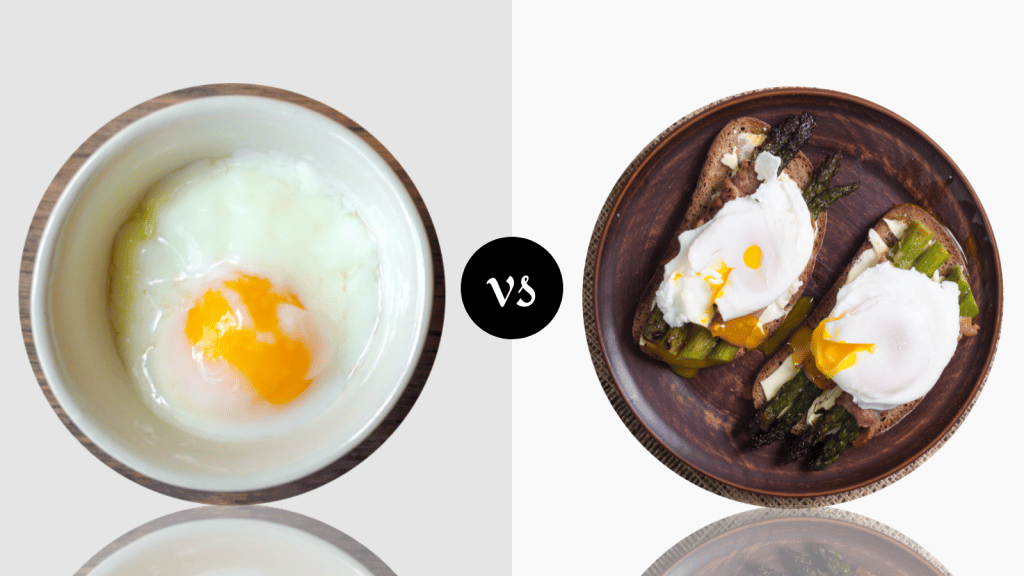
Eggs are the ultimate staple food, and it’s pretty safe to say that they are healthy. There are tons of different ways to cook eggs, but two of the most popular are undoubtedly soft-boiled and poached eggs.
Both are distinctly different, offering a different mouthfeel, texture, and preferred manner of eating.
We’ll be taking you through a comprehensive comparison of soft-boiled eggs vs. poached eggs so that you know all the differences.
From how to make each and the best eggs for each variety to key tips and serving suggestions, we’ve got it all coming up.
Soft Boiled Eggs Vs. Poached Eggs Comparison
| Soft Boiled Eggs | Poached Eggs | |
| Definition | Egg Boiled In Its Shell For Just Long Enough For Yolk To Remain Runny Or Jammy | Eggs Poached To Point Where White Is Cooked And Encases Runny Yolk By Slipping Egg Removed From Shell In Shallow Dish Filled With Gently Boiling Swirling Water |
| Difficulty | Low To Moderate Difficulty | Moderate To High Difficulty |
| Cooking Time | 5 – 8 Minutes | 3 Minutes |
| Method | Lower Eggs Into Gently Boiling Water In Pot On Moderate Heat And Cook Submerged For 5 To 8 Minutes Before Removing And Cooling In Cold Water Then Shell & Serve | Crack Egg Into Bowl/Cup Then Slip Into Water In Shallow Pot Or Pan That’s Been Brought To A Gentle Boil Then Stirred To Create Swirling Action Within Which One Places Egg That Cooks For 3 Minutes Total |
| Best Eggs | Large Eggs | Fresh Eggs |
| Serving Suggestion | Often Served In Shell | Served With Buttered Toast | Served In Ramen Bowl Or Soup | Added To Salads | Buttered Toast, Classic American & English Breakfasts | Eggs Mornay | Eggs Florentine | Eggs Benedict | Creole Cuisine | Portuguese Cuisine | Often Added To Soups/Broth |
| Tips | Medium Heat Only Recommended | Eggs Should Be Warm/Room Temperature | Submerge In Cold Water Immediately To Stop Cooking & Ensure Easy Peeling | Strain Eggs To Prevent White Stringy Dispersion, Cook From Just Below Rolling Boil Only Or White Will Disperse Excessively |
Soft Boiled Eggs Vs. Poached Eggs
Out of the many different ways that you can cook eggs, soft-boiled and poached eggs are easily two of the most popular methods. Let’s take a closer look at these two classic methods of preparation.
Soft-Boiled Eggs
Whereas some individuals have to have a hard-boiled egg, there’s no denying just how deliciously appealing a soft-boiled egg is to the right person.
With the ideal midway point between runny and done, the yellow of each soft-boiled egg is undoubtedly the highlight that can be enjoyed in countless different ways. Let’s see what makes soft-boiled eggs different from poached eggs.
What Are Soft Boiled Eggs
Soft-boiled eggs are eggs placed directly into hot water and boiled in their shells for just long enough to cook the white while leaving the yolk runny and often jam-like, depending on how long it was cooked.
Soft Boiled Eggs Texture
A soft-boiled egg has a texture that varies from very soft and runny to jam-like, with a texture comparable to custard, depending on how long it’s been cooked.
There are three basic stages over which the consistency changes from most runny to least runny and approaching hard-boiled.
Cooking Difficulty
Soft-boiled eggs are relatively easy to pull off as long as you know and stick to the timing. They’re considerably harder than hard-boiled eggs but nowhere as difficult to perfect as poached eggs.
Cooking Time
Five minutes grants a very runny yolk and should be considered the shortest duration of time to cook an egg. Six minutes marks the next stage when the runny yolk begins to turn jammy instead.
By seven minutes, the jammy yolk has developed a custard-like consistency, and from eight minutes or longer, you can safely consider your egg hard-boiled.
The vast majority of people who enjoy soft-boiled eggs, for example, those serving it in a ramen bowl, find six and a half minutes to grant the ideal jammy consistency.
How To Make Soft Boiled Eggs
Bring a pot of water to a low simmer. Don’t allow it to boil rapidly but instead rather reach the point where there is a steady stream of small bubbles.
At this point, slowly lower the eggs into the water and cook for five to eight minutes, depending on the degree of doneness desired. Remove the eggs from the pot and submerge them in cold water to stop the cooking process, or the yolk will overcook.
Best Eggs For Soft Boiled Eggs
The bigger the eggs, the better for soft-boiled eggs. You want an egg with a substantial amount of yolk in order to get the perfect texture and enough of it to be enjoyed.
Serving Suggestion
The overwhelming majority of people enjoy soft-boiled eggs as-is served with buttered toast. Eat it directly out of its shell after cracking off the top and use the toast for dipping.
Soft-boiled eggs should always be consumed immediately. Another great way to eat soft-boiled eggs is to unshell an egg or two, split it, and drop it into a bowl of ramen or a bowl of soup.
Soft-boiled eggs match any dish that suits the gooey center. Pasta and stews are popular accompaniments, and boiled eggs always go great in a salad regardless of whether they’re soft or hard-boiled.
Soft Boiled Eggs Tips
Keep your stovetop running at medium to medium-high heat and no longer. You need to get your eggs in at the point just before the bubbles start rolling, or they’ll crack as they’re lowered into the water.
Don’t take your eggs straight out of the fridge and drop them into boiling water, or they’ll crack. Let them reach room temperature first. Don’t make the mistake of overlooking an ice water bath.
Submerging boiled eggs in cold water stops the cooking process, and it makes the shell peel off effortlessly. If you leave warm eggs to cool down over a prolonged period, instead of cooling them rapidly, the shell ends up getting stuck to the white of the egg.
Poached Eggs
Poached eggs are popular among people who are trying to avoid excessive fats and want to reduce their calorie intake.
What Are Poached Eggs
Poached eggs are eggs that have been cooked by means of poaching, which is a technique whereby the egg is submerged in water in a shallow cooking dish and then cooked gently at a constant temperature that allows the structure of the egg to remain intact.
Poached Eggs Texture
Once perfectly cooked, poached eggs have a cooked white that encases the egg yolk with a texture similar to fried egg white but a gooey yellow center that oozes when cut.
Overall, poached eggs are soft, runny, and extremely delicate as compared to other means of cooking eggs.
Cooking Difficulty
Out of the many different ways to cook an egg, poached eggs are one of the most difficult techniques. Improper poaching technique will result in a half-cooked egg with runny sections of white instead of a runny yolk surrounded by a hard crust.
Without preparing the poaching bath properly and when using old eggs, a great amount of dispersion can occur, leaving a fraction of the egg that you started with.
Cooking Time
No matter how precise you get your water temperature, poached eggs never take longer than three to four minutes to cook to perfection. This will leave the white cooked through and the yolk runny.
How To Make Poached Eggs
Start by boiling enough water to submerge your eggs completely at medium to medium-high heat in a shallow pot or saucepan. Once at a slow simmer, stir the water in the pan to make it swirl, and slide each egg into the center of the vortex carefully.
We strongly advise that you crack each egg into a bowl or cup coated with a little oil first to make things easier and to keep a uniform cooking time and shape for each egg. The ideal temperature for the water is 75°C for those who have a thermometer handy.
Many chefs recommend that you put a teaspoon of vinegar into the water to help limit the dispersion of the egg white. Once dropped into the water, time three minutes and remove. Serve immediately.
Best Eggs For Poached Eggs
Fresh eggs are essential for making perfectly poached eggs. Old eggs disperse when dropped into the water leaving behind white strings known as chalaza.
Serving Suggestion
For the most part, poached eggs are commonly used for making a classic American or English breakfast. Common traditional dishes include ‘Eggs Mornay,’ ‘Eggs Florentine’, and ‘Eggs Benedict.’
However, poached eggs taste excellent on plain toast as well. Poached eggs have become an important part of Louisiana’s Creole cuisine, where they are served during brunches.
Portuguese people often serve poached eggs with chorizo and peas. In some cases, certain chefs add poached eggs to soups and broth.
Poached Eggs Tips
Straining eggs before poaching will reduce the amount of egg white that disperses. Straining is particularly useful for poaching old eggs. Just crack an egg into a strainer and let any excess white drain through.
Clean off the excess dripping egg white and use the egg that doesn’t fall through to poach. You’ll be blown away by just how much this reduces the stringiness of eggs.
Lastly, don’t drop the eggs into the water when it’s boiling too hard, or a great amount of stringiness will occur. The water should be just below a rolling boil.
What Is The Difference Between Soft Boiled Eggs And Poached Eggs?
The main difference between soft-boiled eggs and poached eggs is that soft-boiled eggs are cooked in their shell and then often served in their shell, whereas poached eggs are cracked open and then slipped into hot water for poaching.
Despite the two very different means of cooking, each technique is equally as healthy and results in cooked egg white with a runny yolk.
Which Is Best, Soft Boiled Eggs Vs. Poached Eggs?
When it comes to picking a winner between soft-boiled eggs vs. poached eggs, it largely comes down to your personal preferences.
Anyone pressed for time will end up picking soft-boiled eggs due to the sheer simplicity of making them. While debatable, poached eggs are largely considered a delicacy due to the difficulty of cooking.
Even though they’re preferred by most egg fans and foodies alike, poached eggs are essentially a completely different meal from soft-boiled eggs and can’t be easily judged other than by means of preference.
